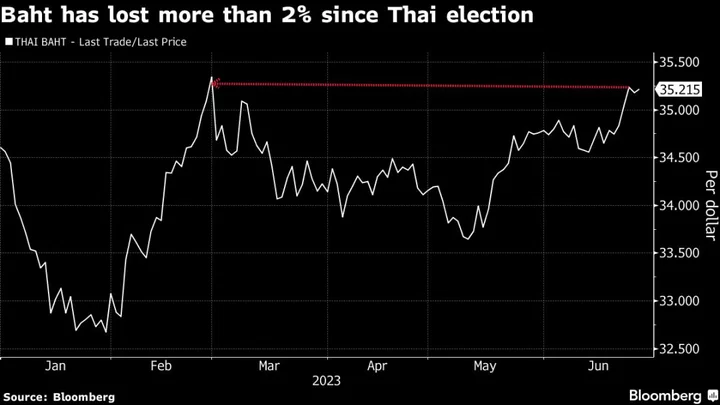Baidu Inc.’s ChatGPT-style Ernie bots are beginning to add to the company’s top line, potentially shoring up advertising revenue for China’s internet search leader during a severe economic downturn.
The company, which this year delivered China’s first major riposte to OpenAI’s ChatGPT, posted slightly stronger-than-expected 6% rise in revenue to 34.4 billion yuan ($4.8 billion) from July to September. Ernie, the company’s moniker for its generative AI model, should help generate hundreds of millions of yuan in additional ad revenue during 2023’s final quarter, the company estimates. Its shares rose more than 1% in pre-market trading in New York.
Baidu is grappling with an uneven recovery in the world’s biggest internet arena after years of Covid-era malaise. Investors worry that the Chinese economy is in danger of entering a deflationary spiral, a fear reinforced by lackluster spending on e-commerce platforms during the just-concluded Singles’ Day shopping bonanza. While better than expected, Baidu’s revenue barely grew from the previous three months.
The company this year joined a race with domestic rivals from Alibaba Group Holding Ltd. to Tencent Holdings Ltd. to develop and monetize their own generative AI platforms. Baidu’s Ernie Bot amassed 70 million users three months after its public roll-out, and the company claims its self-developed model has matched GPT-4 in terms of general capabilities.
Billionaire founder Robin Li said Ernie is now handling tens of millions of queries daily, while thousands of enterprises are working on Baidu’s services.
“We will realign resources to invest in this growth opportunity, and shift away from lower-priority efforts,” Li told analysts on a conference call.
Sandy Xu, the CEO of online mall JD.com Inc., will join its board as an independent director, Baidu said in a statement. Executives noted a weakening of e-commerce marketing, which accounts for about a 10th of overall ad sales, during the September quarter.
Net income came to 6.7 billion yuan in the quarter, versus the 4.4 billion yuan expected. Some analysts noted a quarter-on-quarter slowdown in revenue growth.
What Bloomberg Intelligence Says
Baidu’s growth appears to have come to a halt, with 3Q sequential sales and profit registering a sharp slowdown that raises questions about the sustainability of gains into 2024. Strengthening macroeconomic headwinds — combined with rising AI competition from Alibaba, Huawei and Tencent — likely accounts for the deceleration, though margin expansion helped drive a 10.4% beat in adjusted operating profit.
- Robert Lea and Tiffany Tam, analysts
Click here for the research.
Baidu is regarded as a frontrunner in the country’s budding AI industry, which accelerated after OpenAI unfurled its seminal ChatGPT in November 2022. Li has warned against China’s so-called “war of a hundred models,” where big tech players and venture investors alike pour billions of dollars into startups building AI models from scratch — many of them atop the same open-sourced code.
It’s “a huge waste of society’s resources,” Li said at a Shenzhen event last week. “We need AI-native applications with millions of users, but not hundreds of AI models.”
Baidu, for its part, has infused Ernie into its flagship products from search to maps and file-sharing, and the company now charges a monthly subscription fee of about $8 to users of its latest chatbot. It also operates a cloud service that underpins AI services, is expected to return to year-on-year revenue growth this quarter, Li told analysts on a conference call. Inferencing, or hosting of AI models, could become a long-term source of revenue.
What Bloomberg Intelligence Says
Revenue in Baidu’s core business — excluding iQIYI — is set to remain flat on the previous quarter at 3.8 billion yuan, highlighting a lack of sequential forecast growth in the business, despite new contribution from the ERNIE Bot generative AI tool which remains immaterial. Its operating margin looks set to rise modestly in 3Q, though we see growing downside risks from rising promotional and investment costs in the AI business. Slowing growth in China’s broader economy poses the greatest near-term risk to Baidu’s business, with advertising revenue exposed to a further reduction in business confidence in the country.
- Robert Lea and Tiffany Tam, analysts
Click here for the research.
The Biden administration’s effort to prevent Beijing from obtaining cutting-edge chips for military applications are now affecting China’s tech titans in unexpected ways. Tencent and Alibaba both said on earnings calls last week their cloud computing arms could take a hit from stricter US chip curbs. Those sanctions played a part in Alibaba’s stunning about-face on plans to spin off its cloud arm.
Baidu has enough AI chips in reserve to improve Ernie for the next year or two, and is looking for domestic alternatives. Inferencing also requires less advanced chips, executives said.
Near-term, Baidu still counts on advertising as its bread-and-butter. Short-video platforms including ByteDance’s Douyin remain a threat as they lure users and marketers away. Last year, Baidu’s share of Chinese mobile users’ screentime remained largely unchanged at 8%, while ByteDance increased its slice to 25%, according to QuestMobile data.









